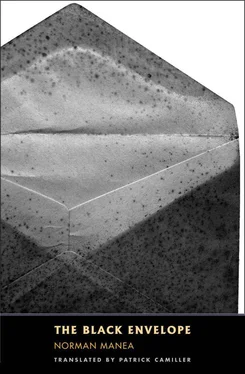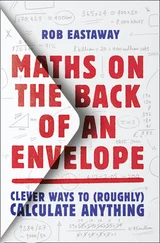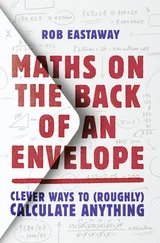The post-wedding and post-funeral dinner, prolonged until daybreak by the skill and hard work of the new head of the family, who takes care not to mention the empty place and what everyone has been thinking all the time without saying it.
An empty place, one setting short . The family reunion will drag on, through thick and thin, until daybreak. With difficulty will they gather the strength to break what has long been broken. Early morning, in the street. The two couples — the Astrid Mircea Claudiu Vancea family and the future Sonia Matus Calinovschi family — are standing on the wet platform of the tram stop. Late revelers from the Bar Levcenco ceremoniously greet the princess who has disappeared from their fox-trot-and-champagne parties. A sure sign that another day really has dawned.
In the dining room, mother and youngest child are silently looking at the uncleared, deserted table.
A hazy hour: the bluish dawn invading the Bar Levcenco on the ground floor of the apartment block. The jolly old Levcenco madhouse is dead as well; it has been for many decades.
The window moistened with dew. The trams started up in the street. Dull grinding movement.
A DARK DILAPIDATED CAFé.The eccentric, distinguished vacationer is waiting with his legs crossed. Wide-open check jacket. Dark-red silk scarf sticking out from the collar of his black shirt. Huge black sunglasses. On the chair next to him: a suede jacket and an umbrella. By the chair a small leather suitcase full of colored labels — the first hour of a short break in the mountains, the first coffee with milk. Coffee with milk, wow! It’s not quite so extraordinary in the mountains, where there are cows, milk, butter, sour cream: you should be able to get a coffee with milk at least. Or at least one without milk. A black coffee, anyhow, that standard coffee, that coffee substitute made from chick-peas, barley, cornmeal, or whatever. Or a tea, at least a tea. Russian, Chinese, English — or at least camomile, mint, lime blossom, whatever.
The distinguished guest did not stand up, did not storm out of the fake café in which there was neither confectionery nor cakes, just endless rows of jam and the same tired old bags of cookies. He did not request the book of complaints or ask to see the manager. He nodded politely at every piece of information and every refusal— thank you, we haven’t got any tea, thank you, there isn’t any coffee or any milk, thank you, we’re out of cakes, we don’t do soft drinks, thank you, the mineral water’s finished, thank you, thank you very much, always with an obliging smile, bent over that glossy magazine, a perfect gentleman! Calm, relaxed, belle époque, a colonial dandy come for a few moments to confer style and fame on the forgotten tourist resort, the pearl of the Carpathians.
And so Anatol Vancea, according to his identity book a receptionist at the Hotel Tranzit in Bucharest, remained like that for roughly two hours, impassive, legs crossed, in the fake café near Sinaia railway station, waiting — for what? no one could have said. Globetrotter’s luggage beside him, decadent color magazine in front of him, waiting, for what? Twelve o’clock, midday, the opportune hour. He was on holiday: with no thoughts, no memory, nothing at all. He was nothing at all, as he wanted to be.
When twelve o’clock approached — the time for room check-in all too familiar to any hotel receptionist — he would therefore head straight for the hotel. He would utter in an artificial voice the number of the reserved room, 326, go up the stairs, have a shower, and expire for a few hours in a deep, prehistoric slumber. The second day, Tuesday, would vanish like the first, in secret. Film, excursion, sleep: who could say? On Wednesday the weather would turn cold: overcast sky, thick black clouds. A walk to the bookshop. On Thursday a trip to the castle, some reading, a stroll around the country houses, through the town and park, to the post office.
Sunday in the mountains has a side that it keeps to itself, as if the day is making fun of you, sniffing haughtily as the hours drift by in a kind of hostile, smoldering provocation. You can pack slowly, without hurrying, as on any old day. You haven’t the least idea where you are going; you don’t know the time of the train or the place; you put yourself, as agreed, in the hands of the void.
Tolea Voinov spent only one boring week in the mountains. A confused, sleepy wait unsure whether to call itself Irina.
Fine weather. The sun takes the forest out of the mists and brings it up close, restores its nobility. The old boyars’ houses are still in place, though ailing and humbled, but the atmosphere, the atmosphere — identical faces, limp, half-finished gestures! Rotten, putrid sleepiness, in a huge cask of stale vinegar, carrots, and manure. No, he hadn’t been able to take it. Not the memories either — no, everything had been at another time. It had been May, another age, yes, another time, long ago, like yesterday.
Irina’s laughter. Waking up in the evening on the terrace of the villa — the lunar tide. Long, long silences, until his tongue grew dry from waiting. One afternoon, walking up the asphalt bend toward the town … Hands raised toward the man’s shoulders.
He had not forgotten the incident, even though a thousand years had passed. A topsy-turvy moment, there in the street, where the asphalt curved toward the town — it was there that they had spun around toward each other. Then a kind of unease, as if the afternoon had broken off and was hanging just on the edge of the idle hour. A heavy, poisoned silence, submerging you in its green silt. You begin to totter, and somewhere you hear suspicious pings of unseen lizards. The lips of some teenagers hurrying by — that was what it had been — could not be removed from the ridiculous sequence; they continued to totter mutely, like senile old people fallen back into the minds of children.
Irina went into the food store, having asked him to wait outside. At the bend where the town was left behind, at the very spot where that little nothing had occurred, he seemed to wake up. He had turned to his partner — Here, let me carry a bag, I see you’ve got two — turned to Ira, taken the plastic bag from her left hand, also the one from her right hand, and they had gone on side by side without talking. They had reached the villa where Irina was staying, a narrow spruce building with a roof of brick tiles. They had walked up the steps and gone down into the hall. Ira had taken off her anorak: she was wearing a large white sweater made of thick wool over her stiff jeans. In one hand she was holding a bottle of red wine, in the other a glass painted with little blue flowers, and a rustic mug.
“There are only two people still lodging here in the villa, and they’re not in much. They’ve got relatives in town and spend a lot of time with them.”
She had half-filled the mug. The wine soon trickled down to his limbs with its pleasant, enervating warmth. At a certain moment he had taken the bottle from the floor and covered it with the empty cup. He had touched her elbow, cupping it in the palm of his hand: Let’s go upstairs. No no, Ira had put him off without conviction. He had pulled her gently, she was already on the brink of the stairs; they had gone up. A tiny little room, a narrow bed like at school, a washbasin, a large attic window through which the moon was entering.
He pulled her toward him, impatiently, clumsily. Let me undress myself — the jeans had slipped off, and on top of them the white catlike sweater. Ira had kept on her long undershirt. A small, simple slippery body — Not like that, let me —burning skin. He had hurriedly lost himself in the narrow body, electrified by the evil light of the moon. Shy dizzy awkward. Ira, her head resting on legs pressed together under the partial cover of a thick blanket, had lit a second cigarette. He was looking nowhere. Then he found the solution: he left that very evening. He had to pack his things and catch the nine-thirty train. Irina had slid off the narrow divan, among the crumpled sheets.
Читать дальше












